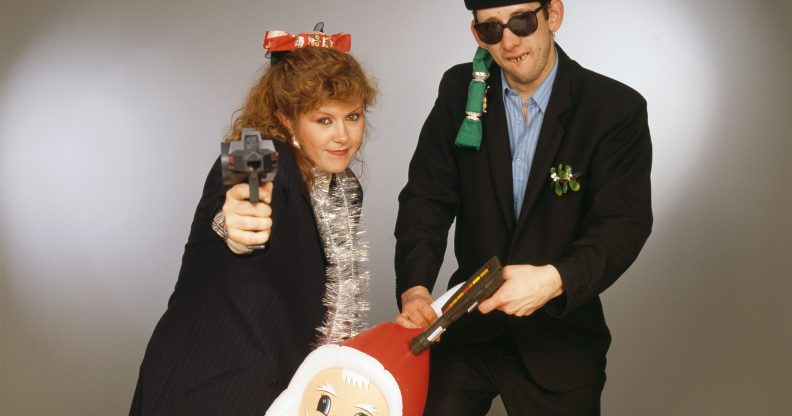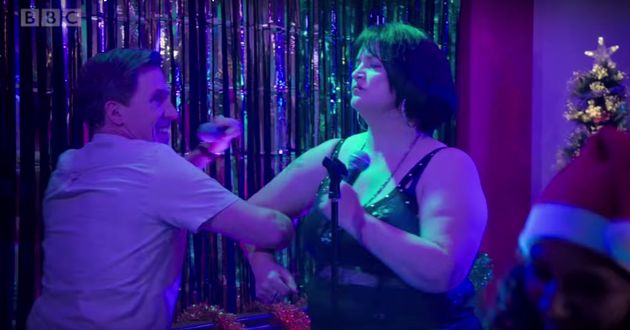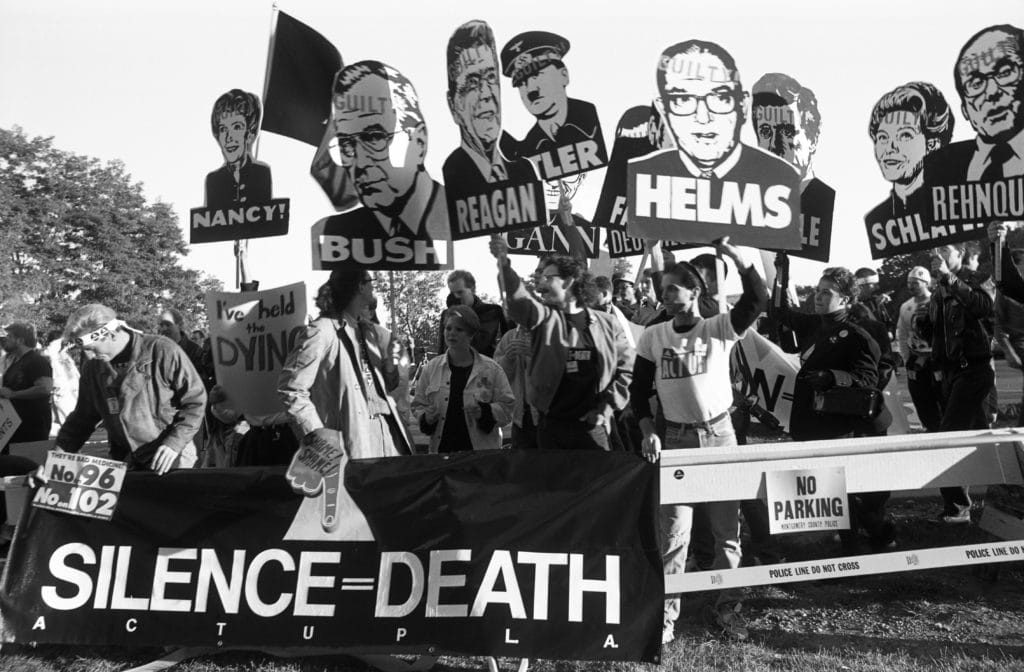Arguing about Fairytale of New York and its homophobic slur is Britain’s worst festive tradition

Kirsty MacColl and Shane MacGowan originally sang ‘Fairytale of New York’. (Tim Roney/Getty Images)
“Fairytale of New York” and its “faggot” lyric provokes impassioned debate each and every Christmas, without fail.
“Fairytale of New York” is, to many, the hallmark of the holiday season, despite it being what can only be described as an anti-Christmas song.
The 1987 banger, by Irish-Anglo band The Pogues and the late Kirsty MacColl, is about two lovers hurling insults at one another. Not exactly the holly jolly merriment that Mariah Carey or her straight male counterpart, Michael Bublé, would have you believe Christmas is about.
It’s a track so tightly tied to Christmas that some people take part in the “The Pogues Game” each year, where players see whether they can go out in public without hearing the song. It’s inescapable.
But going the holidays without hearing the song is a dream to some LGBT+ people. For them, it’s another Christmas, another culture war on whether a lyric of the song – “You scumbag, you maggot, you cheap lousy faggot” – should be sung.
While straight people decide whether they sing the vilified phrase or just mumble it and avoid an awkard moment.
It has its defenders, queer and straight, for sure. Some simply don’t care about the lyrics of a random Christmas song. Others feel that removing the word amounts to censorship.
So, how exactly did a song in which two Irish lovers swap loving terms of endearment – “bum”, “slut” and, indeed, “faggot” – get so popular?
What is ‘Fairytale of New York’ about and why is it so popular?
“Fairytale of New York” was a song two years in the making, troubled by rewrites and binned recording attempts, that went onto become the most-played Christmas song of the 21st century in Britain.
Written by Jem Finer and Shane MacGowan, the song’s production hemmed and hawed after MacGowan and fellow Pogue Jem Finer tossed around the idea of a Christmas tune. Its title was inspred by JP Donleavy’s novel of the same name that Finer was reading.
The song is styled like an Irish folk ballad and tells the tale of a melancholic alcoholic reminiscing in a New York City drunk tank about his girlfriend, all to the tunes of pipes and drums.
The man, played by MacGowan, is thrown into a cell to sleep off his Christmas Eve drinking binge. He dreams of his girlfriend (MacColl) and the two quickly begin trading barbs about how down on their luck they are.
The ‘Fairytale of New York’ ‘faggot’ controversy has been rumbling on for decades
Of course, being that the song is clogged with usually bowdlerised words, it drew denouncement immediately upon its release.
The BBC, as well as several other broadcasters, often censored certain words of the song’s lyrics throughout the late 1980s and early 1990s. Sometimes “faggot”, sometimes “old slut”, or sometimes swapping “arse” for “ass”.
During a live performance on Top of the Pops in 1992, MacColl went one stop further and changed the lyric altogether, singing: “You’re cheap and you’re haggard”.
And, believe it or not, the world did not end when she did so.
Many singers, from Ed Sheeran to Ronan Keating, have also dropped the word from their cover versions.
Indeed, the debate over the song and the frustration and contention it brings is in no way new.
On Thursday (November 19), BBC Radio 1 announced it is playing an edited version of the track that leapfrogs over the word “faggot”. Radio 2 will air the original, while indie dad-friendly Radio 6 Music will let its disc-jockeys decide what version to play.
Feeling déjà-vu? BBC bosses made a similar move – Radio 1 not playing the song, but Radio 2 doing so – before U-turning in 2007 .
Debate erupted last year when the BBC One comedy, Gavin & Stacey aired two characters doing a karaoke version of the song, belting out “faggot” for all LGBT+ people tucking into turkey on the couch to hear.

The outdated slur was broadcast to more than 11.6 million viewers, who were divided. Some decried what would have been an opportunity to reinvent the festive song while others shrugged it off as “just a song”.
And the division the song splits is in no way unique to just listeners.
Should ‘faggot’ be edited out? Yes and no, say The Pogues
Frontman MacGowan himself has defended “Fairytale of New York” and its use of “faggot” in 2018, arguing that the song has to be listened to in the context of when it was written – the late 1980s.
It’s not being used in a way that’s homophobic, he said, before adding that he’s fine with broadcasters bleeping it if they see fit.
“The word was used by the character because it fitted with the way she would speak and with her character,” he said in a statement at the time. “She is not supposed to be a nice person, or even a wholesome person.
“She is a woman of a certain generation at a certain time in history and she is down on her luck and desperate. Her dialogue is as accurate as I could make it but she is not intended to offend!”
This amplified a similar defence from musical comedian Mitch Benn, who argued in 2010 that “faggot” was Irish and Liverpudlian slang for a lazy person.
“Faggot” is a word that has a slew of meanings that have changed in its decades of use. Yet, it certainly doesn’t get used nowadays to refer to a bundle of sticks, and even when done so, that doesn’t erase the hurt it can still cause who can only hear it as a word packed with prejudice.
The word as homophobic slang in America stretches as far back as the early 1910s, etymologists say.
Moreover, “faggot” was not exactly far removed from homophobia in 1980s New York, the context of the song itself.
At the time the song was written, New York and beyond heaved with anti-gay sentiment. A “gay plague” was ripping across the US all while then-President Ronald Reagan and his officials did nothing but laugh.

In the present day, hundreds of radio stations bleep or mute swear words and slurs from countless songs every day.
Yet, for some reason, removing a deeply homophobic word provokes a weird reaction from some people who, with such vim, demand the sacred right to yell or at least hear the word “faggot” in a song they only care about once per year.
Regardless of its intended usage, whether referring to sticks or stupidity, the word overwhelmingly means something hateful and malicious to LGBT+ people. Doing logistical jujitsu just so you can say “faggot” will ultimately always involve ignoring the pain the phrase can cause.
And it seems that MacGowan now agrees. Through The Pogues’ official Twitter account, the band took aim at right-wing commentator Laurence Fox after he complained about the BBC censoring “faggot” from “Fairytale of New York”.
“F*k off, you little herrenvolk s***e,” they hit back, both putting Fox in his place and appearing to agree that editing the word out really is no big deal.
Following the announcement that BBC Radio 1 will censor the song, which came alongside news that the British government is scrapping vital funding to anti-LGBT+ bulling schemes in schools, The Pogues made their stance on the debate perfectly clear.
There’s no doubt that “Fairytale in New York” is a fantastic song and will continue to be a beloved Christmas classic for years to come.
Shoppers will roll their eyes as they hear it for the 707,273rd time that day. Drunk bar-goers will badly sing it and sway at work Christmas dos. Radio listerners will hum it as they prepare dinnner.
Whether people choose to sing the word or not, those shoppers and bar-goers and radio listeners should remember that the word, whether sung to a jaunty Christmas tune or otherwise, still has power.
How did this story make you feel?

